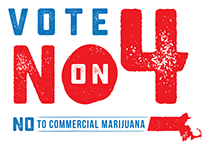Question 4's co-author admits that "virtually every [marijuana shop] applicant I have worked with has been rejected in one town or another."
BOSTON –The marijuana industry stripped control away from homeowners and communities under Question 4 because they knew that people do not want pot shops in their own neighborhoods, the Campaign for a Safe and Healthy Massachusetts said today. Under Question 4, local communities and homeowners are given significantly less ability to restrict the number or location of marijuana businesses than we have seen in the Massachusetts casino law, the medical marijuana law, and even marijuana legalization laws in other states.
Today’s Boston Globe report on the the medical marijuana law outlined the concerns raised by local cities and towns and their steps to reject proposed medical marijuana shops in neighborhoods.
The Globe article quotes marijuana industry consultant and Question 4 co-author and signatory Kris Krane as acknowledging that his marijuana dispensary clients are very unpopular with local communities and their residents: “Virtually every applicant I have worked with has been rejected in one town or another. The smart applicant is working five to seven towns simultaneously.”
In Colorado, with even stronger controls given to local communities, it has resulted in more pot shops than McDonalds and Starbucks combined.
Statement from No on 4 Campaign Manager Nick Bayer
“Question 4 is not a legalization bill, it is a giveaway to the commercial marijuana industry. The marijuana industry knew that people do not want pot shops in their neighborhoods, so they purposefully wrote a law that strips away the ability of local residents to have a say whether these pot shops are located near them. The Yes on 4 campaign simply isn’t telling the truth on how Question 4 handcuffs cities and towns and harms homeowners.”
Among Question 4’s limits on control for homeowners and communities are:
- In contrast with the state’s medical marijuana law, Question 4 states that MARIJUANA STORES DO NOT NEED TO OBTAIN LOCAL OFFICIALS’ SUPPORT in order to set up shop in a community.
- BARS communities from restricting “home grows” which means anyone CAN SET UP A MINI POT FARM in their home or backyard, even if it’s next to a school or homeowners around them object.
- In contrast to Massachusetts’ casino law and Colorado’s commercial marijuana law, it forces a community-wide referendum to “OPT-OUT” of allowing the marijuana industry into their communities.
- SETS NO LIMIT on the number of stores that can sell marijuana statewide or number of operations to grow or manufacture marijuana.
- SPECIFICALLY AUTHORIZES marijuana edibles (products like candy bars, gummies, “cannabis cola,” etc.), oils and concentrates.
- BARS communities from restricting “home grows.”
- INCLUDES LEGAL LOOPHOLE for the marijuana industry to challenge and potentially invalidate any state or local rule deemed “unreasonably impracticable.”


